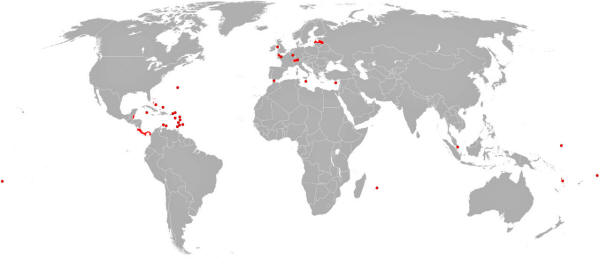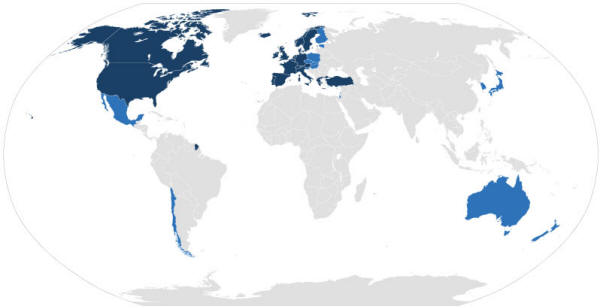|

by Dan Mitchell
11 February 2015
from
InternationalMan Website
|
Dan Mitchell is an
economist and senior fellow at the Cato Institute. He's
a strong proponent of tax competition, financial
privacy, and fiscal sovereignty. You can read his blog
here. |

Tax havens have a valuable role in the global economy.
They facilitate the efficient allocation
of capital; they encourage saving and investment; and because of
tax competition, they encourage
better policy in the rest of the world.
As noted in the New England Journal of International and
Comparative Law, tax competition serves a beneficial role. It
forces greater fiscal responsibility and affords taxpayers the
ability to enjoy more of what they earn. This in turn draws savings
investment and skilled labor into the economy.
But economic efficiency isn't the only reason that
tax havens should be preserved.

These low-tax jurisdictions also should be defended on a moral
basis.
Most notably, they offer a safe haven
for people subject to persecution.
It isn't very well understood that the vast majority of the world's
population lives in nations where governments fail to provide the
basic protections of civilized society. Indeed, in many cases,
governments are the problem, as corrupt ruling elites use their
power to exploit people. Corruption often is rampant, expropriation
is common, crime is endemic, and there's widespread persecution.
Not surprisingly, people with money are common targets of
oppression, particularly if they're a religious, political, ethnic,
racial, and/or sexual minority.
Tax havens help protect these people from venal and incompetent
governments by providing a secure place to hide their assets.
Indeed, one of the reasons why Switzerland has such an admirable
human rights policy of protecting financial privacy is that it
strengthened its laws in the 1930s to help protect German Jews who
wanted to guard their assets from the Nazis.
Many groups in the world face discrimination and hostility, often
from government.
The ethnic Chinese in nations such as Indonesia and the Philippines
often are resented by the local population. The same is true for
people of Indian descent in East Africa.
When you belong to a group that is unpopular and susceptible to
being targeted by the government, it makes sense to protect your
family's interest by putting your money someplace like Hong Kong,
where the politicians from your country can't find out about it. If
they can't find out about it, they can't steal it.
In other words, the financial privacy laws that make tax havens so
attractive to French families and Swedish entrepreneurs who want to
escape oppressive taxation are the same laws that protect other
people from different forms of persecution.
Let's look at the example of political dissidents from places such
as Russia or any of the 107 nations listed as "not free" or "only
partly free" by
Freedom House. These people (or the
civil society groups that they operate) have a big incentive to keep
their money where the political elite can't seize it.
Imagine if you're a farmer in Zimbabwe. Would you want to leave your
assets in a local bank where the nation's dictator can arbitrarily
confiscate your money?
Of course not.
You're going to put your money in a
jurisdiction that's honest and well run, such as the Cayman Islands.
-
Or what about the Argentine
family that wisely has little faith in its government's
ability to maintain the value of currency?
-
Would you want to leave your
money in a local bank, oblivious to the risk that your
family's life savings could be wiped out overnight by
devaluation?
-
Or what if you're an
entrepreneur in Venezuela?
-
Do you keep your assets in the
nation and report them on your tax return when there is
corruption in the tax office and your personal data may be
sold to kidnappers, who then grab one of your kids?
If you have any sense whatsoever, you
place your money in a bank in Miami, since America is a tax haven -
at least, if you aren't a US citizen or US resident.
International bureaucracies such as,
...are attacking tax havens as part of a
campaign orchestrated by high-tax nations. Uncompetitive governments
don't like tax competition; they instead would prefer to create a
global tax cartel - sort of an OPEC for politicians.
With this in mind, it's remarkable that even the international
bureaucracies acknowledge the valuable role of tax havens on
financial privacy.
The United Nations, for instance, admitted in a 1998 report that for
much of the 20th century, governments around the
world spied on their citizens to maintain political control.
Political freedom depends on the ability to hide purely personal
information from a government. Too bad the UN bureaucrats are
ignoring these warnings and pushing for global taxation.
But
the United Nations isn't the only
hypocritical organization.
A former leader of the OECD's anti-tax
competition project, Jeffrey Owens, recognized the role of
tax havens as protectors of human rights. As reported by the UK
based Observer, Owens stressed that tax havens are essential for
individuals who live in unstable regimes.
Even a former Clinton-era Treasury
Department official who was closely involved with the OECD's
anti-tax competition campaign admitted,
"[H]ow far do we want to go with
this information exchange and the secrecy issues, the privacy
issues and so forth, which relates to the problems of corrupt
governments, a danger to your children and to individuals? That
subject should be discussed."
Let's quickly touch on a few other moral
issues.
The campaign against tax havens interferes with the right of
jurisdictions to pursue pro-growth policies, which is especially
discriminatory against poor nations.
Having no or low taxes is the main
criterion for being listed as a tax haven by the OECD, yet most OECD
nations didn't have income taxes during the 1700s and 1800s, which
was the period of time when they climbed from agricultural poverty
to middle-class prosperity.

OECD Member
States
We should all be offended that nations such as France and Germany
became rich when they had no income tax, and now they want to deny
that opportunity to poor nations that want to follow the same
development strategy.
Speaking of discrimination, it's also a bit unseemly that powerful
nations in Europe are targeting less powerful jurisdictions from
places such as the Caribbean. Somebody needs to tell the bureaucrats
in Paris that the era of colonialism is over.
Another issue is the OECD's hypocritical treatment of capital
compared to labor. The Paris-based bureaucracy is upset that
investment funds are flowing to low-tax jurisdictions, many of which
are in the developing world.
But OECD nations are big beneficiaries
of a brain drain from developing nations.
This flow of talent is very beneficial
for labor inflow nations, just as global financial flows are very
beneficial for capital inflow nations. Yet the OECD isn't suggesting
that developing nations have the right to tax immigrant income
earned in OECD nations, so why should OECD nations be allowed to tax
flight capital in non-OECD nations?
Speaking of hypocrisy, what about the fact that the OECD doesn't
blacklist its own members?
The United States, the United Kingdom,
Austria, Belgium, Switzerland, and Luxembourg are all OECD member
nations; yet they weren't on the OECD's blacklist. Only smaller,
less powerful nations were subject to this form of discrimination.
Of course, the ultimate hypocrisy of all is that the bureaucrats who
work at the OECD and the United Nations all get tax-free salaries -
while they're running around the world trying to demand that other
nations raise their taxes.
Politicians from high-tax nations and their flunkies at the
international bureaucracies often admit that the moral issues raised
in this article are very pertinent, but they then say that they're
worried that tax havens enable some of their residents to avoid the
tax net.
-
But why is that the fault of
jurisdictions with better tax policies?
-
If high-tax nations want better
compliance, shouldn't they fix their tax systems instead of
trying to bully other nations into surrendering their fiscal
sovereignty and becoming vassal tax collectors?
|



